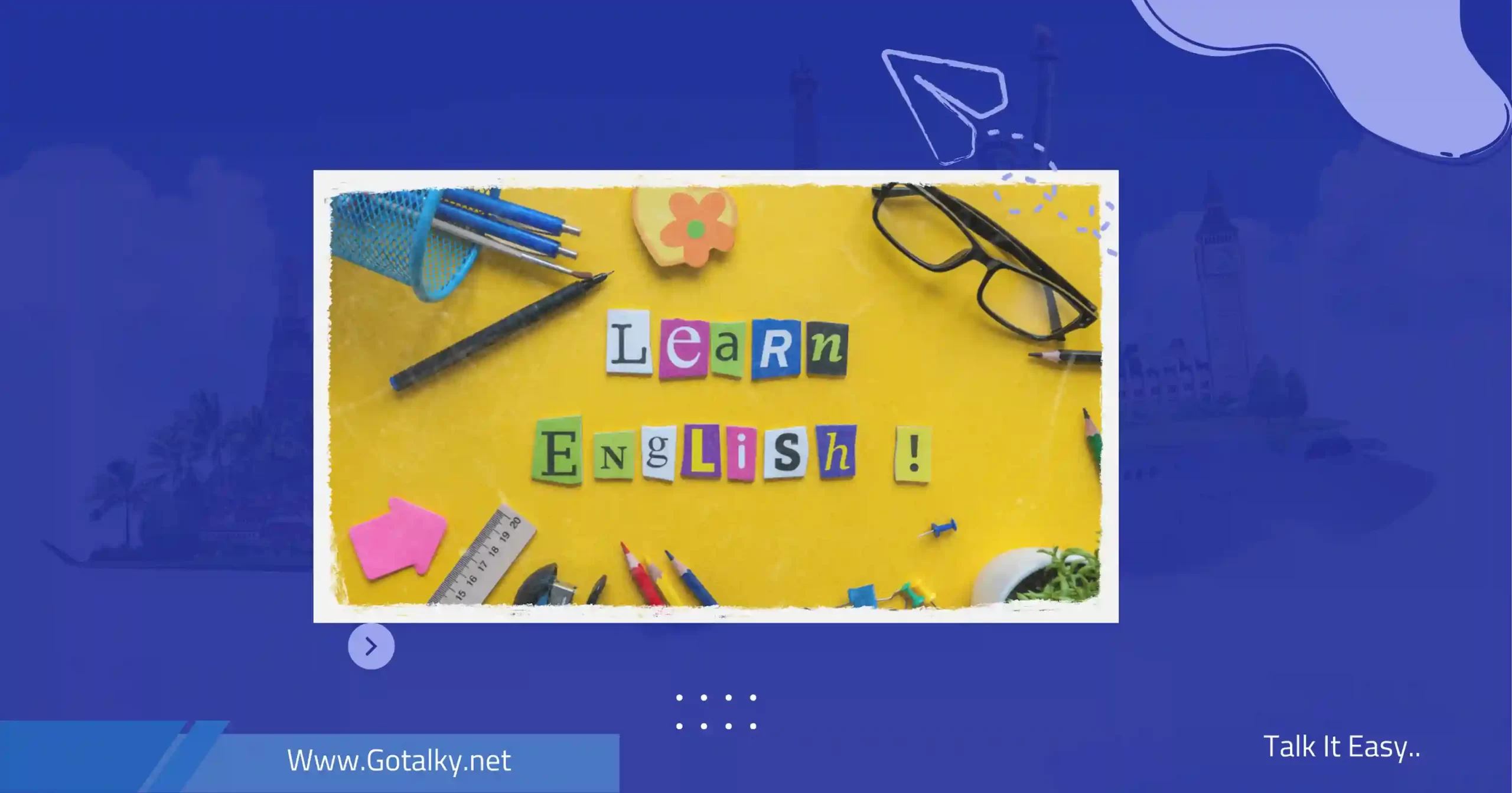Steps for Learning English with GoTalky
Here are some fundamental steps that our educational platform offers to help you learn English:
- Set Your Goal: Why do you want to learn English? Do you want to communicate with people from other cultures? Do you wish to advance your education or career? Or do you simply want to enjoy content in English? Setting your goal will help you stay on the right track.
- Assess Your Current Level: Before you begin learning, it’s essential to assess your current level in English. You can do this by taking a placement test or seeking assistance from a tutor.
- Choose Your Learning Method: There are various ways to learn English. You can study individually, join a class, or use online resources. Choose the method that suits your learning style and interests.
- Start Practicing: The best way to learn English is through practice. Try to speak English whenever possible, whether with a friend, teacher, or even with yourself. Practice listening, reading, and writing as well.
- Don’t Give Up, Learning English is a Gradual Process: You may encounter obstacles along the way, but don’t give up. Keep practicing and learning, and you’ll see progress in the end.
Tips for Learning English:
- Start with the Basics: Before you can speak and write English fluently, you need to learn the basics, such as the alphabet, numbers, and basic vocabulary.
- Focus on Vocabulary: Vocabulary is a crucial aspect of language learning. The more words you know, the better you can communicate in English.
- Emphasize Speaking and Listening: Speaking and listening are essential language skills. Try to speak English whenever possible and listen to native English speakers.
- Don’t Fear Making Mistakes: Everyone makes mistakes when learning a new language. Don’t fear making mistakes; it’s part of the process.
Why Practice is the Best Way to Learn English:
Practice is the key to developing fundamental language skills, including vocabulary, grammar, and pronunciation. Through consistent practice, you’ll become more fluent in English and communicate more effectively.
Reasons Why Practice is the Best Way to Learn English:
- Develops Basic Language Skills: Regular practice exposes you to vocabulary, grammar, and pronunciation, enhancing your overall language skills.
- Builds Confidence: With practice, you become more comfortable using English. The more you practice, the more confident you become in your abilities.
- Improves Speaking, Listening, Reading, and Writing: Practice is crucial for all language skills. When you practice speaking, listening, reading, and writing, you become better at each. There are various ways to practice English, such as speaking with native speakers, watching movies and TV shows in English, reading books and articles, and practicing writing in English. The more you practice, the better you’ll become at English, so take your time and practice regularly. You’ll see significant progress in a short time.
Tips for Practicing English Effectively:
- Start with Small Goals: Begin with achievable and small goals. Don’t try to learn everything at once. Start with goals like learning 10 new words a week or engaging in a short English conversation.
- Make Learning Fun: Choose activities you enjoy and integrate language learning into your daily life to make it enjoyable.
- Don’t Fear Making Mistakes: Everyone makes mistakes when learning a new language. Learn from them and continue practicing.
- Seek Support from Others: Join an English learning group, find a friend, or a teacher who can help you stay on the right track.
Methods for Learning English:
- Individual Study: This method is the most flexible, allowing you to study anytime, anywhere. Many resources are available online and offline, including books, courses, and apps.
- Join a Classroom: Learning from a professional teacher and interacting with other students in a classroom setting is beneficial. Various types of classes, including traditional and online, are available.
- Use Online Resources: Numerous excellent online resources, such as websites, apps, and podcasts, can be effective for learning English either individually or in a group.
- Travel to an English-Speaking Country: Traveling to an English-speaking country is a fantastic way to practice English and communicate with native speakers. If you have the opportunity, try visiting for a few weeks or months.
What You Want to Achieve from Learning English:
It’s crucial to know that learning English enables better communication with people worldwide. Language is a powerful tool that breaks cultural barriers and builds bridges between people. Additionally, it allows access to more information and useful content. Here are specific goals I want to achieve through learning English:
- Engage in Natural Conversations with Native Speakers: Achieve the ability to have natural and smooth conversations with native English speakers.
- Read and Understand English Texts Confidently: Develop the confidence to read and understand English texts effectively.
- Write Clearly and Accurately in English: Gain the ability to write in English with clarity and accuracy.
- Duration of Learning English: The time required to learn English varies based on several factors, including your current language level, learning method, and commitment. Generally, most people can reach a conversational level within a year or two. However, achieving advanced fluency may take longer.
Estimations for the time needed to achieve different proficiency levels in English are as follows:
- Conversational Level: 1-2 years
- Intermediate Level: 2-3 years
- Advanced Level: 3-5 years
It’s essential to remember that learning English is a continuous process. Even after reaching a certain level of proficiency, ongoing practice is necessary to maintain fluency.
Study Plan for Learning English:
A study plan for learning English is a roadmap that outlines your goals and the steps you’ll take to achieve them. It can help you stay on the right track and accomplish your objectives in English language learning.
GoTalky provides anyone who wants to improve English speaking with a variety of courses like the speaking English course, English speaking classes, the online English course, the English fluency course, spoken English lessons, the English speaking training, the advanced English course, the speaking and pronunciation course which is considered the best English speaking course and so much more. It also offers help to anyone who wants to improve their language. Here are some steps provided by the gotalky platform that you can take to create your own English study plan:
- Define Your Goals: What do you want to achieve through learning English? Do you want to have natural conversations with native English speakers? Do you want to read and understand English texts? Do you want to write in English clearly and accurately?
- Assess Your Current Level: What is your current proficiency level in English? You can take a level assessment test online or seek help from a teacher or private tutor.
- Choose Your Learning Method: There are various ways to learn English. You can study individually, join a classroom, or use online resources. Choose the method that suits your learning style.
- Create a Time Schedule: Determine the amount of time you want to allocate for studying English each week.
- Identify Resources You’ll Use: There are many resources available for learning English, such as books, courses, apps, and videos.
- Track Your Progress: It’s essential to track your progress so you can see the results of your efforts.
- Key Words in the English Language: Basic words in the English language are frequently used words that are crucial for effective language understanding and usage. These words help you comprehend and communicate in English more efficiently. Here is a list of some basic words in English suggested by gotalky:
- Pronouns: I, you, he, she, it, we, they
- Verbs: be, have, do, go, see, say, like, want
- Adjectives: big, small, tall, short, happy, sad, good, bad
- Nouns: boy, girl, man, woman, house, car, book, pen
- Numbers: one, two, three, four, five, six, seven, eight, nine, ten
- Adverbs: here, there, now, then, up, down, in, out
- Prepositions: of, to, from, with, on, in, at
This list is not exhaustive but includes some commonly used basic words in the English language.
Tips for Learning Basic Words in English:
- Start with the Most Common Words: Begin by learning the most common words. There are dictionaries and apps that can help you identify the most frequently used words in English.
- Associate New Words with Familiar Words or Ideas: Link new words with words or concepts you already know. This will help you remember new words more easily.
- Regularly Practice New Words: The more you practice new words, the better you’ll become at remembering and using them.
Through consistent practice, you’ll be able to learn and effectively use basic words in the English language in both conversations and writing.



